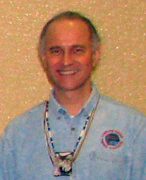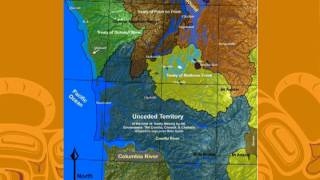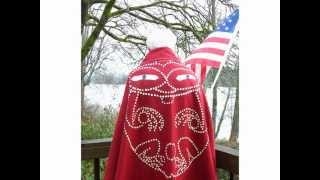|
My family My family has a long history in Washington State. We are descended from Jean‑Baptiste Provoe and his wife, Contoe, a Stikine River Tlingit. Provoe was employed by the Hudson's Bay Company at Fort Vancouver, and later they settled to live with the Cowlitz Indian tribe. The oral history of our family tells that Jean‑Baptiste, who was French‑Canadian Métis, was half‑Indian, but it was due to the fact that Contoe was Stikine and that they resided and identified with the Cowlitz, that the federal government stipulated they and their children—one of whom was named David—along with several other Indian children of former Hudson's Bay Company employees, were all members of the Cowlitz tribe. Many of them also intermingled their bloodlines with the Cowlitz and other local Indians through marriage. Later, our bloodline would become connected to the Cowlitz through marriage with Sally Umpkane.
Sally Umpkane, whom we believe lived among the Nisqually for a time, was the wife of John Kindred, the youngest son of David and Talitha Kindred, who were members of the party that established Tumwater, the home of the first European-American settlers on Puget Sound. Sally Umpkane was a member of the Black River band of the Upper Chehalis tribe, not far from Willapa, WA, an area frequented by the Cowlitz. Moreover, Northern Cowlitz frequented the south shore of Black Lake, from which the Black River flowed. Both the Nisqually and the Chehalis are related by blood to the Cowlitz, as are the other local tribes, including the Squaxin Island tribe, Yakama and Puyallup. The Cowlitz people have many cousins in those tribes. And, although there is no mention of her on the Internet, dissolution of Umpkane's marriage to John Kindred by State Statute is recorded with the Thurston County Courthouse in Olympia, Washington.
John Kindred and Sally Umpkane had a daughter, Mary, who married David Provoe. One of their daughters, Laura May Provoe, married Nels Brown, and together they had 3 children, Walter, Helen and Tom. Helen, my paternal grandmother, married Maurice Van Mechelen, and they had 3 children, Juanita, Dan and Don. My father, Dan, earned a Bachelor of Science in Mechanical Engineering at the University of Washington while working at Boeing. After graduating from high school shortly after the end of World War II, he enlisted in the U.S. Navy and served at Western Pacific Fleet Headquarters in Qingdao (Tsingtao), where he learned enough Mandarin to visit with the friends he made there. He recalls being able able to hear the guns of the Red Army about 30 miles away as they left to return to the States in 1949. My mother, Bernice, has extensive documentation on her family and genealogy, and perhaps later I will add more about that. At this time suffice it to say that her mother, who is of Cherokee and Jewish descent, married an immigrant from Sweden who committed suicide when my mother was 8 or thereabouts. Her sister, whose eldest son is my age, lives in California. By virtue of geography our families are not close but my cousin George and I share similar views and maintain contact via e-mail. Dan served as chairman of the Quinault Allottees Association (now called Allottees Association & Affiliated Tribes of the Quinault Reservation) from 1975 to 1986 and worked closely with Helen (Mitchell) Saunders, who is of Quinault and Cowlitz descent, on the United States v. Mitchell cases. Based on historical records and anthropological data, he wrote History of the Quinault Reservation and later produced the two videos, below:
As he retained a strong interest in China, its culture and history, Dan retired as chairman of the Allottees Association and accepted a position as a corporate representative to the Xi'an Aircraft Company during inception of the 737 vertical fin project. After two years in China they decided that it was time to return home and retire. As they had traveled extensively throughout Asia and Europe, they wanted and requested a flight direct from Beijing to SeaTac International Airport, and when they learned that they had been booked on a flight that would take them to London and then New York, they refused. Dan called and arranged for a nonstop flight. He made the right call: The flight they were originally scheduled to take was Pan Am Flight 103. My Tribal activities From 2001 through 2012 I took on several responsibilities within my Tribe, and served on Tribal Council from 2002 to 2012, Health Board from 2001 to 2011, Cultural Resources Committee from 2004 to 2012, I was on the Education Committee for a few years, served as the chair of the Communications Committee and Awards & Recognition Committee for a few years, and I was also the Tribal Webmaster from 2003 to 2011. In 2002 I created the Cowlitz Country News list, and after resigning from all my board and committee posts in 2011 but before I resigned from Tribal Council in 2012 I started the Cowlitz Country News website, a news aggregation site for tribes of the Pacific Northwest in North America. My practices A (periodic) member of the Life Extension Foundation, I have never engaged in drug abuse, I have never smoked and I have had no alcohol since July 2003. Having an Indian metabolism I am prone to Type II Diabetes. As a child I got sugar rushes from eating potatoes, and today I subscribe to the Primal Living lifestyle, also known as the Paleolithic Diet, which eliminates all grains, legumes and a few other staples of the modern diet, and focuses on meats, fruits, vegetables, root tubers, berries and fermented foods. Although I eat a lot and never feel deprived, I lost a lot of fat and currently weight about 15lbs more than I did in high school. Several years ago I had a girlfriend who was a yogi, and I took up Yoga. Though I'm not very strict about it, I still do it from time to time. At one point shortly after a spinal infection killed my L4 disk, my weight climbed to 270lbs. Thanks to years of bodybuilding I didn’t look fat, but the muscles were heavily padded with fat and I felt bad. Today my weight hovers around 180 lbs. The person I am most eager to meet is my wife. But I have no intention of referring to her as "wife." To steal a phrase from one of my favorite authors, L.E. Modesitt Jr., I will refer to her as my "consort," which will connote the nature of our relationship: equal and complementary. My Politics I'm a "Ron Paul" (libertarian) Republican. While in college I supported Ronald Reagan, but after he and Alan Greenspan implemented policies to create a bubble economy I joined the King County Libertarian Party. I was fortunate to attend the Libertarian Party National Convention in Seattle where I witnessed Russell Means run for the nomination. He was very impressive! The first time Ron Paul ran for president was as a Libertarian and I voted for him. In 2004 I joined the Republican Party to increase the participation of Indian Country in the right-wing of the mainstream political duopoloy, and I attended the Republican Party National Convention in New York City, following which a friend and I were invited to the White House to witness President George W. Bush officially announce the opening of the National Native American Museum in Washington, D.C. Although I wrote several articles in support of President Bush in 2004 and early 2005, it got to the point where the best I could muster was to refrain from saying anything because I strongly disagreed with just about everything they did. It was exciting to see the election of an African American president in 2008, though by this time I had given up on any hope that the duopoloy would ever amount to anything more than two sides of the same coin. But when Ron Paul emerged as a contender in the 2012 elections I regained my enthusiasm. By the summer of 2012, however, it was very obvious that the Establishment would do anything necessary to ensure Ron Paul was not the Republican candidate, and in retrospect it appears that the sole purpose of Mitt Romney's candidacy was to ensure that nobody else got the GOP nomination and that President Obama won a second term. My views I believe that women and men are equal but that our differences extend beyond the superficial anatomical features. Our differences are designed by nature (God, Creator, Great Mystery, whatever you want to call it) but that femininity and masculinity exist on a spectrum that defines most men and women, and it is for them and their families that most social institutions exist. But there are always outliers, unique individuals who defy the norm. They should not be held back by gender norms and stereotypes. Being of a libertarian bent, I believe that we are best served by liberty. Traditional societies are intrinsically conservative and I believe that although the monolithic American Indian culture imagined by mainstream myth never existed there is a uniquely American Indian Conservatism that is largely compatible with the Classical Liberal writings of Edmund Burke and Russell Kirk, but that also includes principles espoused by Tom Paine, and that Indian country, America and the World would benefit from explorations into and further development of this Conservatism. It is a conservatism that preserved social institutions while generally affording a degree of freedom and liberty that, until the American Revolution, was unheard of throughout most of the rest of the world. The principles of this American Indian conservatism include: belief in an enduring moral order that is both spiritual and pragmatic though not necessarily religious; respect for long-standing customs and traditions; respect for inter-generational continuity; high regard for the virtue of prudence; values diversity; accepts that people are imperfect and that there is a process for correcting and forgiving mistakes and failure; values freedom and liberty; respects personal property (though land ownership was never part of our traditions); places high value on community and civic duty; believes that it's good to limit personal and familial power; encourages virtuous living; and many tribes, including mine, understand that respect for tradition has to be balanced with the need for progress and change. My sites
I maintain and own the following web sites:
My life After I graduated from Mount Rainier High School in 1971, I enrolled in Highline Community College where I took Pre‑Med classes. Dad paid for my first quarter but I paid for the rest of my education by working full and part‑time jobs. In 1973 I transferred to the University of Washington but after only one quarter I dropped out. At the suggestion of a friend in my church, I earned an EMT Certification and went to work on an ambulance. At this time nobody knew I have Asperger's Disorder. When I was 3‑years‑old I went through the classic "autistic transition." My father doesn't speak of it but from my mother's description it sounds like it was typical. What I remember of that time are fragments of black and white cartoons, a few brief moments of linear lucidity, such as the day my brother was born, going to my grandparents' house and eating a second lunch, and the dust dancing in the morning sunlight that streamed through the living room window that looked out over the small field that separated us from the north end of SeaTac International Airport. On what date I shifted from Autism to Asperger's Disorder (these are frequently referred to as Autistic Spectrum Disorders, or ASD), I don't know, but I clearly recall the moment. My father got me a Melissa & Doug toy called Pound‑A‑Peg. I have no idea how many days, weeks or months I pounded on it but at some point I exteriorized enough that I began to get bored. Now, my parents feared that I was "mentally retarded" and it caused them no small amount of anguish. My hammering struck my mother as a percussive reminder that her son was a retard and coincidentally just as I started to grow bored, she snapped, "Roderick stop it!" (My full name is "Roderick Daniel Van Mechelen," but let's just keep that between you and me.) She was astonished and overjoyed when I responded normally and then began to play. From then on I was "a very good child," according to her. However, although I am the oldest of their three children I am not the firstborn. My older brother died when he was only a few days old, on October 1st, 1951. In folklore and psychology that makes me a ghost child. My mother's over‑protective behavior generated a degree of resentment in my father, who has always been very, shall we say, assertive. (His aggressive nature was due in part to growing up in a time when even close friends denigrated my grandfather as a "squaw man" and told my father, "Danny you're a nice boy but you can't help but grow up to be a shiftless alcoholic" because he was Indian.) At about this time my mother's sister came to stay with us while she divorced and then remarried the father of her children. During this time there was an incident when my cousin George and I accompanied him to a store, riding in his 1949 Chevy Pickup truck. On our way home George did something he didn't like and when George wouldn't stop Dad smacked him. Not too hard but just hard enough to get his attention. Although I had experienced violence I had no memory of it prior to that incident, and startled I began to whimper. Dad told me to stop or he would slap me. Frightened, I burst into tears. Dad slapped me. Not too hard but hard enough to trigger the rampant growth of that part of my autistic brain that processes anxiety. From that point on anxiety and depression dominated but did not derail my life. By age 10 I was struggling with Clinical Depression, although at the time I didn't know what it was. But in my family we don't allow infirmities to stop us. When my paternal grandfather's back was crushed and doctors said he would die, he refused to be crippled, let alone die from it, and he led a long and productive life. So, neither ASD nor depression stopped me. Until the late 1990s years ago I did not know that I have ASD, and it was until the late 2000s that I was formally diagnosed. But the hurdles are formidable. Fortunately there is no apparent genetic predisposition to depression in my family, so although my siblings and I were caught between a violent home and pervasive bullying at school, made worse by white teachers who viewed their three Indian students as an annoyance rather than a responsibility, we persevere to this day. The challenges imposed by ASD are fairly well known and make the standard public and college classrooms a gauntlet of bright but washed‑out lighting, distracting noises, inconsistent principles rife with exceptions, strange behaviors, and more. In retrospect it is not surprising that it took me 10 years to graduate from the University of Washington or that, although I completed a full year in biology and chemistry, and coursework in a broad spectrum of subjects, including calculus, computer programming, speech communications and public policy, I came away with only a Bachelors in Business Administration. Since then I have worked for several employers, including United Parcel Service, Merrill Lynch, Microsoft, US West⁄Qwest, FEMA (in 2001), and currently the State of Washington. |
 My name is Rod Van Mechelen, I was born in Seattle, currently reside in Olympia, and I am an enrolled member of the
My name is Rod Van Mechelen, I was born in Seattle, currently reside in Olympia, and I am an enrolled member of the 

